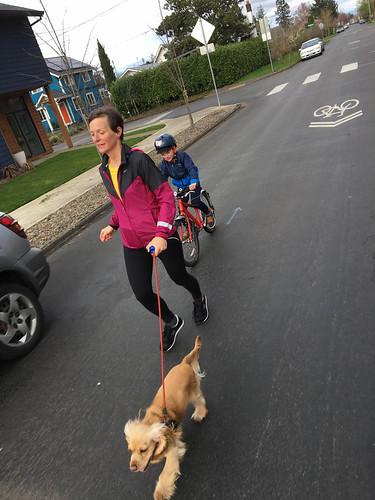It’s been a good week for active transportation at the legislature. They said yes to Safe Routes to School, they killed an irresponsible highway-building bill, and they set the stage for Portland to take a major step in street safety.
So far this week, the Oregon House has voted yes on three bills we’re watching. They all passed overwhelmingly, garnering 26 “ayes” and just one “nay”. We shared the good news about the Safe Routes to School bill (HB 3230) on Wednesday. The day before that the House Committee On Agriculture and Natural Resources passed the Oregon Coast Trail Bill (HB 3149), which will establish a State Parks fund to hasten development of a plan for a walking trail along the coast.
We also learned this week that HB 3231 will not move forward. This is the bill that would have given cities and counties the ability to form powerful tolling districts and build new highways completely independent of planning or public oversight. After getting summarily shot down by respected opposition voices in a public hearing last week, the champion of the bill, Washington County Republican Rich Vial, shared news of its demise in his latest constituent newsletter. “Last Friday,” he wrote, “I was informed by the committee chair that HB 3231 would not receive a work session by the April 18th first chamber deadline, which prevents the bill from moving forward this session.” Good riddance!
The big day for sensible transportation policy was Wednesday, when the House Committee on Transportation Policy voted unanimously to pass HB 2682 which gives the City of Portland the ability to lower residential speed limits to 20 mph without first getting permission from the state. As we reported on Tuesday, the bill changed dramatically from its original form. The one that passed Wednesday limits the geographic scope of the bill to just Portland (instead of the entire state) and limits the type of roads the lower speed limits can be applied to.
Advertisement
“Something needed to be done.”
— Rob Nosse, Oregon State Rep (D-Portland)
HB 2682 is sponsored by Portland House Representative Rob Nosse. During testimony to the committee Wednesday he said, “Something needed to be done,” to stem the increase in traffic fatalities. “I think this bill will do a lot of good in my district — the residential district in the state — and it will improve collision outcomes.”
Elizabeth Edwards, a member of the City of Portland’s Government Relations staff, told lawmakers that the five mile per hour difference, “Is life or death in many instances.”
After Rep. Nosse’s testimony, Committee member and Representative Ron Noble (R-McMinnville) said he wished his district could have these same powers. “I’m disappointed it’s only in Portland,” he said. Rep. Noble shared that the City of McMinnville has requested lower speed limits from ODOT in the past, only to have the resulting traffic analysis end up in a higher speed based on the 85 percentile rule the state uses.
The impact of the bill would be profound. As quickly as they could switch out the signs, the City of Portland’s Bureau of Transportation could make 20 mph the maximum speed limit on 4,827 miles of our roads. The bill would apply to all residential, non-arterial roads in Portland — about 61 percent of our total road inventory. In the past, PBOT would have to ask ODOT for permission to do this, triggering traffic analysis studies and an onerous process that could take over a year to complete for just one street segment.
Suffice it to say PBOT is eager to get this bill passed. It would allow them to essentially make 20 mph the default speed of every residential street in the city.
“We’re excited that the bill has advanced another step,” PBOT spokesman John Brady shared with us this morning. “We’re going to continue working with our Portland delegation to keep this momentum going.”
Let’s hope the bill speeds through the Senate as well.
UPDATE, 4/24: This bill has officially passed the House by a vote of 55-1. See the latest coverage via The Oregonian.
— Jonathan Maus: (503) 706-8804, @jonathan_maus on Twitter and jonathan@bikeportland.org
BikePortland is supported by the community (that means you!). Please become a subscriber or make a donation today.



